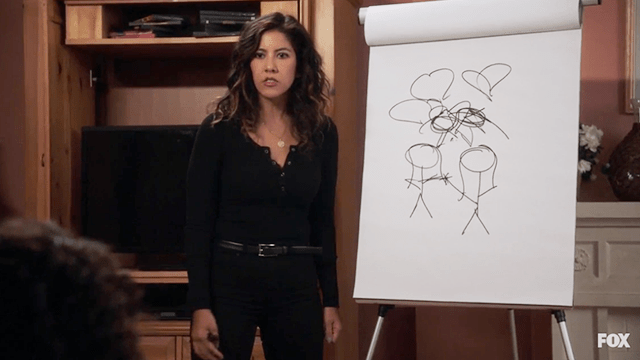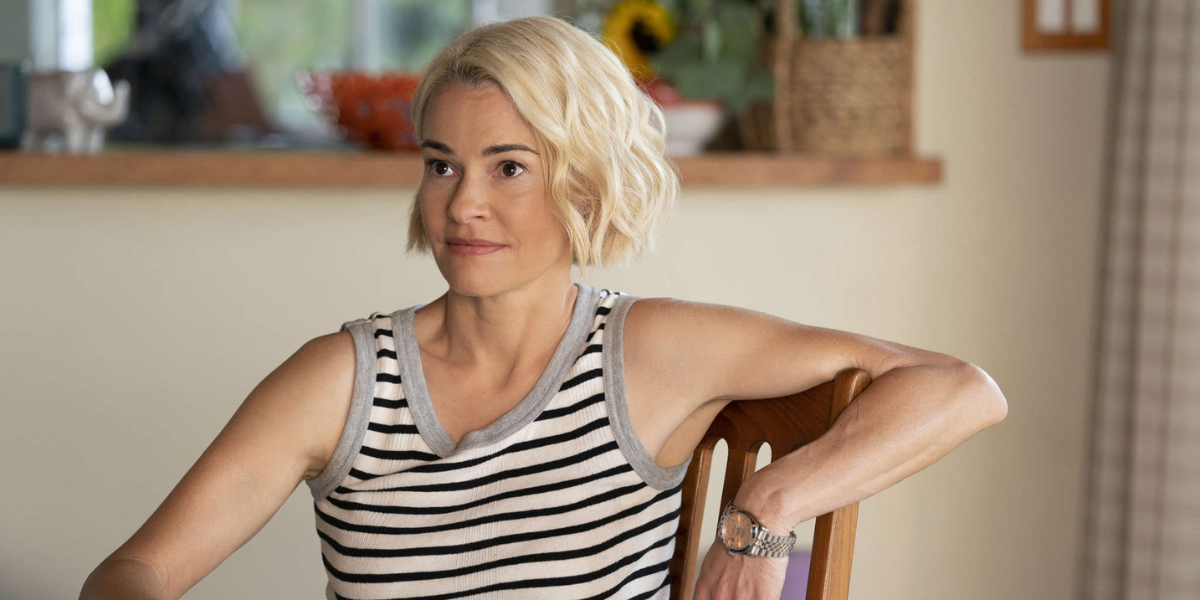Last week we got the long-hoped-for treat of queer fan favorite Rosa Diaz coming out as bisexual on Brooklyn Nine-Nine, an experience made better by the fact that she’s played by out bisexual actor Stephanie Beatriz, who’s openly advocated for her character’s queerness. As Heather wrote when the episode aired, a lot was done right that’s often done wrong with bisexual storylines — Rosa explicitly says she’s bisexual, something we rarely see, and the writers included Beatriz and her input in creating the storyline.
And it shows, even more so in “Game Night” than in “99.” After being kind of outed by Boyle’s nosiness in the previous episode, Rosa decides to intentionally come out to her coworkers and, later, her parents. It’s established that while Rosa’s coming out to others is new, coming out to herself is not — she tells Amy she’s known she was bi since seventh grade. It’s notable how much this arc is focused on sexual orientation as a character trait rather than a plot point — the focus is never on Rosa’s relationship with this new woman (although I do want to know more about that!) but the fact that bisexuality is an important part of Rosa’s identity and always has been, something that’s refreshing to see. Parts of Rosa’s coming out are probably pretty relatable to all queer people, like Amy asking “when did you know?,” Boyle’s awkward overcompensating allyship, and the implication that Hitchcock was going to say something gross and sexualizing if given the chance. Especially in her interactions with her parents, though, Rosa’s coming out arc feels specifically and uniquely bisexual in a way I’m not sure I’ve seen on television before.
There isn’t one conversation with her parents, like ripping off a bandaid; there are several, and even after all of them Rosa’s relationship with her parents as an out bisexual woman feels rocky and bittersweet in a way that’s very real. It’s clear they love her, but they still can’t readily accept her — and to the extent they do, it’s conditional upon an imagination of bisexuality as a version of heterosexuality. As her mother insists, “because no matter what you call yourself, you still like men. So you can still get married and have a child.” Rosa reminds them that she can do those things regardless of the gender of her partner, only to be told by her father, “Yes, but it will be a man, because this is just a phase.”
A minute later, we get to complete bisexual coming out bingo when he admits he thinks “there’s no such thing as being bisexual.” Rosa’s response is clear and simple and painful: “I know there is, because that’s who I am.” The entire scene is a more thorough exploration of the way that bisexual people’s acceptance by their loved ones so often depends upon our willingness to reassure them that we’re still “basically straight,” or that we can at least pretend to be. Later, when Rosa’s dad apologizes but explains that her mother “needs more time” and that maybe Rosa shouldn’t come by for family game night anymore, we see how Rosa’s refusal to cosign a straight-with-an-asterisk or going-through-a-phase narrative of her own erasure has at least for now cost her exactly what she was afraid it would. This is a coming out conversation that feels like it was intended to feel authentic from the inside out, not only to be legible or recognizable to straight viewers, something that still feels like an unexpected treat.
What stands out to me maybe even more than the nuances of Rosa’s coming out to her parents are the (unfortunately few!) interactions between her and Captain Holt, her openly gay captain. The homophobia and isolation Holt faced when he first came out in the police force decades ago has been previously discussed, something he alludes to briefly when Rosa comes out to the squad: “This is going considerably better than when I came out to my colleagues.” At the end of the episode, when the squad comes together to comfort Rosa after the complicated experience with her parents, Holt tells her,
“Diaz, you should be very proud of yourself. I know things aren’t exactly where you wanna be right now, but I promise you they will improve… Every time someone steps up and says who they are, the world becomes a better, more interesting place, so thank you.”
It’s very cool to see two entire openly gay/bisexual characters talking explicitly to each other about coming out in a mainstream sitcom. It’s also very cool that this reads as a moment of emotional growth and closeness between two characters who have been consistently socially and emotionally withdrawn. In fact, in previous seasons Holt has reacted to younger colleagues’ comparatively easier coming out experiences with (misplaced but understandable) resentment — it’s really neat to see him moving past that to be genuinely happy for Rosa, and to see her allowing him to comfort her about the hard parts of it. It made me wish Holt could have been the team member Rosa chose to help her with coming out, rather than Jake — and that we could have seen her discuss the process with other queer people too, like her mystery girlfriend.
Maybe in the future we can! The way this story has been unfolding so far, I’m hopeful that it will remain a tangible throughline on the show rather than an arc that opens and closes, and that we can see Rosa’s identity and ongoing relationship with her parents and girlfriend continue to play an active role in her storyline and dynamics on the show. Also, duh, that Gina Rodriguez or Jen Richards can play her girlfriend. Fingers crossed!







